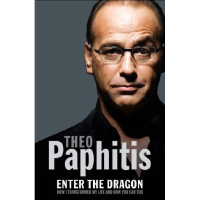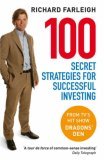I have already read a couple of books by panelists from Dragon’s Den, the BBC TV show that puts would-be entrepreneurs in front of self-made millionaires for their money or their ridicule.
On Saturday I picked up another — Theo Paphitis’ Enter the Dragon — in a Waterstones’ 3-for-2 offer.
Perhaps I’ve become a Dragon’s Den groupie? I’m certainly not reading these books for their literary qualities.
100 Secret Strategies for Successful Investing by Richard Farleigh is like the brain dump of a share bulletin board poster with verbal diarrhea. There wasn’t much takeaway value, though Farleigh’s rags-to-riches tale was heartening.
Duncan Bannatyne meanwhile took time off from snarling at the inventors of dog treadmills and revolutionary shower caps to write Anyone Can Do It.
Bannatyne wasn’t promising much more than a pep talk, but his book worked better than Farleigh’s, perhaps because Duncan made his initial money selling ice creams, whereas Fairleigh earned his wodge investing other people’s billions — not really an option for most of us.
So what about Theo Paphitis? The Dragons are famously competitive: Does Theo measure up?
Enter The Dragon: How I Transformed My Life and You Can Too is at least snappier to read than its title.
However as both a business book and an autobiography, it’s pretty mediocre, and it doesn’t live up to its billing. Enter the Dragon would only transform your life if you were short of kindling on a freezing mountain side and you tore it up to get a fire going.
That’s not to say there aren’t laughs and insights. Paphitis’ best quality is his lack of pretension, and it shines through here.
It’s impossible not to warm to a man who admits he got one O-Level in ‘colouring maps’, and who spends a page of his book recounting with clear delight the time he brought his pimped-out truck to the Dragon’s Den set to drown out Peter Jones’ Ferrari.
However even more than Bannatyne and Farleigh, you get the impression that Paphitis is a born wheeler-dealer who can’t teach us mere mortals much except by example.
A committed family man, Paphitis was married before he was 20 (which doesn’t make for a salacious biography) and he’d had a swathe of sales-orientated jobs and roles by 30. Along the way he’d gone solo and back more times than a member of Take That. (Well, two or three times, but Theo wouldn’t let the facts get in the way of a gag!)
Indeed, one of the best sections is when Paphitis is ousted from the listed company he’d battled to save, Astra, in the late 1980s. He describes a feeling of listlessness that I found very true from when I left my own start-up company with rather mixed feelings.
Theo finds himself lolling about on a boat, his paper millions gone to the wind and with just £100,000 or so stashed away to “get back in the game”. That might sound a lot, but for a man who had worked 17 hour days since his late teenage years, it was a flimsy reward.
Paphitis bounces back, of course. He buys a media advertising company, and then turns around stationer Rymans and fancy pants chain La Senza with a combination of canny deal-making and inspiring leadership, and the rest is history — especially if you’re his bank manager.
Success in business means listening
Theo Paphitis puts his success down to his focus on his staff.
As a first-generation immigrant who started penniless and who recognised (but doesn’t bemoan) certain prejudices when he started working, Theo has an empathy with the front-line men and women ordering the stock and ringing the tills.
He clearly understands what real inspiring leadership is all about: not grandiose claims, but being there for his people. And he’s not full of airy-fairy nonsense. He motivates his best workers with weekly targets and holidays to the Caribbean.
For Paphitis, the key to making more money in business is discovering what is going wrong and then fixing it. This can be pretty simple stuff — he reinvigorated the shop floor at failing lingerie chain Contessa by putting microwaves and fridges into the staff room.
As he writes:
You don’t need to bring in consultants to find out what is wrong with a business — just ask the staff. They’ll know the answers. That’s all consultants do.
There is a great moment in the book where his usual appeal to staff gambit fails him, though.
Standing on a chair and addressing La Senza employees, Theo writes:
I finished my speech with my usual call for everyone to buy into my dreams and ambitions. I told them I wanted them to be flowers in my garden. “Anyone who doesn’t want to be a flower in my garden, and wants to be a flower in somebody else’s garden, well, I’ll shake your hand, we’ll have a leaving drink, and we’ll part as friends. If you don’t want to be part of the future, you can go right now.
I was just about to go on to my next bit when half a dozen people picked up their coats and left.
It’s a sign of Paphitis’ confidence that he includes such a moment in the book.
Enter the Dragon at your own risk
The trouble with Enter the Dragon is there’s plenty of sweet little asides but not much of a roar.
I read it cover to cover in a couple of hours, but it was only in the way my girlfriend would read Does My Bum Look Big In This? (free tip — the answer is always no).
Paphitis story is an entertaining romp, but it’s hardly an essential business read. There’s a boring bit about football that might appeal if you’re particularly interested in the fortunes of the Millwall F.C. from a few years ago. There’s also the inevitable Dragon’s Den tips.
Finally, as if realizing he hasn’t really given readers any idea how they can ‘transform their lives’, there’s a chapter of 12 golden tips bolted on to the end. These are fair enough (I’ll run through them later this week), but Tom Peters they ain’t.
It’s all very vague stuff, capping a book that talks about clever business deals and property portfolios and banking shenanigans but gives us very real little insight into any of it. You’re left feeling a bit like you’ve overheard Paphitis chatting up a would-be client in a pub, rather than getting much advice on being in business.
Ultimately, if you’re only going to buy one Dragon book I’d have to suggest you go for Bannatyne’s. He does a much better job of banging away at the essentials and firing you up.
In contrast I finished Enter the Dragon marveling more at how Paphitis managed to make so much out of nothing, both in terms of his business opportunities and his pleasant but uneventful private life.
More happens to Richard Branson in Losing My Virginity in a page than happens to Theo in whole chapters of Enter The Dragon.
Still, if you’re a glutton for entrepreneurial insights, or if your girlfriend is deep into Do My Breasts Look Saucy In This? (or your boyfriend is reading sci-fi!) and you want some escapism, then Enter the Dragon is a nice enough diversion.








Comments on this entry are closed.
I loved the review, Investor! Despite your recommendation, though, I think I’ll buy this guy’s book anyway. He seems like a real no-nonsense type and I can relate to that.
I could relate to The LaSenza anecdote, as I had that same thing happen to me once before on a dysfunctional project I was working. The fact that it happened to Paphitis only confirms my original belief that it happens more frequently in the business world than one might think. Not many folks will ever admit to it though.
My $0.02 (0.012 pounds) after taxes,
Len
Len Penzo dot Com
Amazing! I am doing a book review on this at the University of Huddersfield where he is an ambassador for my course and I have found your book review really helpful. He is a genuine pleasant man am I have found that this book take a look at his life as if we were there at the time (with slightly tinted glasses); I agree with your comments about Millwall F.C. I too found that part a bit boring, and that it is not a true hard going Business book. It’s a great read though! I have really enjoyed it!